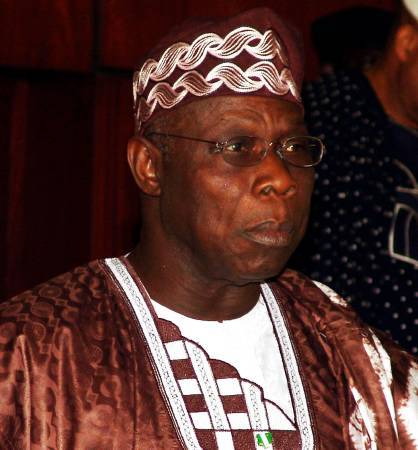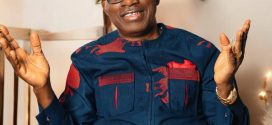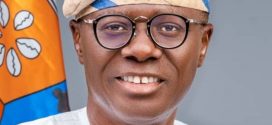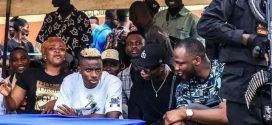This is Mr Adeniyi column in Today’s Thisday where he took time to reply President Obasanjo
“…Segun Adeniyi, who is a poor apologist for Yar’Adua, made almost every case of reversal worse in his book. Not only is Adeniyi a poor apologist, but he also did not do a good job of denigrating Obasanjo. Rather, he showed his principal as an ingrate; mean, petty, vindictive, unfocused and rudderless; hypocritical, and a man who easily buckled under pressure. Well, maybe that was what he wanted to portray and convey. He may have boosted his own ego by his book and proved to any discerning reader that Umaru orchestrated the pull-Obasanjo-down activities at the Villa and in the government. I can only thank him for leaving nobody in doubt.
“When Segun Adeniyi came to apologise to me, for the second time, at Eko Hotel in Lagos in November 2012, at the Airtel Night of Influence lecture given by Fareed Zakaria, I reiterated to him what he already knew, and that there was no need for an apology. I pointed out that an author or writer must pursue and honour truth and accuracy. Wanton disregard for accuracy, for whatever reason, might hurt the victim; and the money or reward gained by the writer can be regarded as ‘blood money’.
“It is possible that Segun was showing genuine remorse – which will be good for him, the Nigerian media and even the nation – because in his subsequent column in THISDAY newspaper he reported the encounter fairly accurately. For legitimate and lasting success as a writer, your mind must be clear, your pen must be clean, your statement must be true and accurate and your bias or prejudice must be revealed. And where you have hurt others or made a mistake advertently or inadvertently you must be honest and manly enough to admit it, apologise, and make amends.
“ It is also significant, and I was made to understand, that while Segun Adeniyi might have satisfied himself by rushing to write his book, Yar’Adua’s family, friends and most members of his administration were neither amused nor pleased with it for a number of reasons. Maybe he did not write to please anybody but himself by chronicling what he knew, and surmised from his narrow and limited angle of vision without any research or enquiries to get a broader perspective. I have no doubt that Segun is learning the right lessons as evidenced from his action at Zakaria’s lecture.
“Segun had hand-written a letter of apology to me on 12 November 2007, calling himself ‘an opposition’ reporter, acknowledging the level of perfidy he had learned on his new job and seeking forgiveness from me. I wrote back to him, “forgiven and restored”. But from his book, the flame of opposition remained in him, to some extent…”
=====================================================================
When during a lunch break in the course of the 2014 Port Harcourt Book Festival in October this year, Dr. Egbosa Imasuen, the COO of Kachifo publishing house came and sat opposite me, I knew something was amusing him when he started chuckling. I did not have to wait for long before he let the cat out of the bag: “Segun, expect Baba’s reply to your book very soon.”
Since President Olusegun Obasanjo seems to have appropriated the title of Baba, I knew instantly who Egbosa was referring to but still wondered the nature of the response so I sought to know how. “In his coming book that Kachifo is publishing. Baba yab you no be small”, he added in Pidgin English before laughing.
Right there and then, I requested that I should be given a copy of the book the moment it came out. I believe I had a right to that because when the promo of my Yar’Adua book came out before the release in December 2011, Obasanjo had requested that he be given a copy the moment it arrived. And he was obliged with Kachifo CEO, Mr. Mukhtar Bakare, driving with a copy to Ota at midnight on the day the consignment arrived the country.
So when the consignment was cleared from the Port last Friday night at a time one desperate politician was trying to abort a pregnancy that had already resulted in the birth of a baby (to borrow a famous proverb of the late MKO Abiola), I got my copy the next day before I left Lagos where I had gone to deliver a paper. Surprisingly, Obasanjo started the volume three of his book with what I would consider the longest review of my book, “Power, Politics Death: A front-row account of Nigeria under the late President Yar’Adua” to which he devoted more than ten pages!
What are the issues in my book that rankle him? One of them is my narrative of how former River State Governor, Dr. Peter Odili was edged out of the presidential race, an account that has been corroborated by Odili himself in his book as well as the manner I presented the drama of the Peoples Democratic Party (PDP) National Convention that produced Chief Vincent Ogbulafor at a time he (Obasanjo) wanted to throw Chief Ojo Maduekwe into the ring. Since he has a different impression of Yar’Adua, Obasanjo also does not like my positive portrayal of the late president who to him was a bad man.
While Obasanjo had no problem with my account of the turmoil that led to the ouster of Mrs Patricia Olubunmi Etteh as House of Representatives Speaker, he believed it justified his assessment of Yar’Adua as a weakling. Obasanjo also interprets differently the accounts of the deportation of the Vaswani brothers, the travails of the Economic and Financial Crimes Commission (EFCC) former chairman, Mallam Nuhu Ribadu and the Federal Ministry of Health saga involving his daughter, Senator Iyabo Obasanjo-Bello. From the Chukwuma Soludo-led CBN Naira redenomination to the National Independent Power Project and the Third Term saga and other issues, Obasanjo also gave his own version to contradict mine.
The foregoing are some of the issues in my Yar’Adua book on which Obasanjo did a rebuttal which I consider fair enough. However, it is also possible that beside the contents of my book, Obasanjo may have other personal grouses with me that I don’t know since he talked about “a very close friend of the Villa and a member of Yar’Adua’s inner circle, a minister from Katsina, (who) spent two nights in my house in Abeokuta when all of this was over. What he told me, which may or may not have been true, was astounding, and for me another good lesson.”
Since I do not know how to deal with the rumours and gossips that Obasanjo may have been told about me by his “Katsina mole”, let me now deal with the issue of my complex personal relationship with him. Obasanjo wrote that I have apologised to him twice in the last seven years, one in Aso Rock and the other in Lagos. While it is true, I need to state that my apologies were not because I wronged Obasanjo but rather on account of what appears to be his hostility towards me.
By my upbringing and disposition, if someone is apparently unhappy with me, rightly or wrongly, particularly one old enough to be my father, I simply make peace with that person. That was what I have done with Obasanjo and since he agrees that my account of the second encounter is accurate, let me now narrate what happened on the first occasion.
On November 12, 2007, the first Council of State meeting held under Yar’Adua and as usual, Obasanjo was at the Villa but even though he greeted everybody, he refused to acknowledge my greeting, and it was not the first time. I recall my late boss once asking me, “What have you done to Baba?” because Obasanjo always made it obvious that he was deliberately ignoring me. On that particular occasion, he said: “O kii se Omoluabi” (You are not well brought-up).
As it would happen, in the course of the Council of State meeting, my seat was directly behind Obasanjo’s and as the session went on, I became very uncomfortable. At a point, I picked the papers in front of me and wrote him the said note. He read it, looked back and smiled. About five minutes later, he handed me a paper on which he wrote his terse reply that I had been forgiven and restored.
The only person who witnessed the drama of our communication was then Speaker of the House of Representatives, Hon Dimeji Bankole whose seat was close to Obasanjo’s and he was chuckling throughout even though he was not privy to the contents of our exchanges. I was therefore surprised when the next day as I walked to the office of then Chief of Staff, Major General Abdullahi Mohammed (rtd), he said: “Segun, you didn’t tell me you and your Baba have been exchanging love letters.”
Immediately he said that, I thought Bankole must have recounted to him what happened, especially when I asked him who told him and he said he would not tell. Then after playing pranks with me on the issue, he produced a photocopy of my handwritten note to Obasanjo and said: “This is a photocopy of your handwritten note to Baba. He said I should give you and also collect from you a photocopy of his own response.”
I was lucky I still had the paper because at that period, I was not meticulous in keeping such things and that encounter helped me to begin to keep proper records of documents so I have Obasanjo to thank for that. Now, if I apologised to Obasanjo, is it because I have wronged him? No. It is because he believes I have wronged him and was always relating with me based on that conviction. So if it makes him happy that I have apologised to him and I am indeed forgiven and restored to his good books, I feel satisfied with that as I would like to follow peace with all men, especially him.
In any case, whatever may have been my disagreements with Obasanjo over the years, I hold a certain affection for him. However, that has also not deterred me from criticising whatever actions of his that I considered to be worthy of appraisal, as I did in the course of his presidency, even when I tried to be fair.
It is noteworthy that my uneasy relationship with Obasanjo spans more than 15 years now. Our paths first crossed in August 1999 when, to commemorate his first 100 days in office, THISDAY Board of Editors decided to have an extensive interview with him. The session held around 7am at the Villa after which I was left behind to spend the next 24 hours observing him at work, at home and at leisure in what was to be a major cover story titled “24 Hours with the President” published in a special edition of THISDAY Newspaper along with his interview.
Not only was the edition well received at the Villa, it was very popular with the public at a time majority of Nigerians were hooked on Obasanjo. So for some weeks, I was a “good boy” with Obasanjo and the people around him. But when I started criticising the president in my back page column, the characterisation of me at the Villa changed.
Despite all that, and to Obasanjo’s credit, when in February 2004, Mrs Obiageli Ezekwesili shortlisted nominees for the governing board of the Nigerian Extractive Industry Transparency Initiative (NEITI) to be inaugurated by the president, she nominated me to represent Nigerian media and Obasanjo approved it at a time I was very critical of his administration. I will never forget that.
The NEITI role gave me both local and international exposure because as head of the Media sub-committee, I attended many EITI global sessions in France, United Kingdom, Norway etc while the assignment gave me access to vital information about the oil sector in Nigeria. Interestingly, whenever we had meetings with Obasanjo at the Villa at the period, he would spend considerable time abusing me but he never queried my NEITI membership which he in the first place approved.
By November 2005, I became the title editor at THISDAY at about the time the Third Term rumour had started and my newspaper took a stand against it. So that put me in the line of direct confrontation with the Villa. By 2006 when the Third Term project was in full steam I came out with my book, “The Last 100 Days of Abacha” which was written to remind Obasanjo of the self-perpetuation fiasco of the late General Sani Abacha. Incidentally, he requested for a copy of the book even before it came out and when it did, I sent it to him through then NSA (and current Defence Minister), Lt General Aliyu Gusau.
Eventually, the Third Term project collapsed and Obasanjo backed the late Yar’Adua to succeed him and the rest as they say is now history. However, by then our relationship had broken down almost irretrievably so for me to end up in Aso Rock as presidential spokesman could not be pleasing to Obasanjo even though he did not do anything to oppose my appointment. However, it is possible such a “silly appointment” in itself could have been one of the “offences” committed by Yar’Adua.
Obasanjo is like Constantin Demeris, the Greek tycoon character in Sidney Sheldon’s bestseller, “The Other Side of Midnight”, who never forgets an insult nor forgives an injury and that is very clear in his book as he deals heavy blows on those he considered to have wronged him. Former Federal Capital Territory (FCT) Minister, Mallam Nasir el-Rufai needs to get a copy quickly not only to find out from Obasanjo which of his (el-Rufai) friends was sleeping with the wife of a prominent citizen in his guest house but also to read what his former boss wrote about him.
In my own case, I think Obasanjo was rather very mild. But there are so many people who will challenge him while not a few others would feel embarrassed by what Obasanjo attributed to them. Indeed, some aspects of the book read like revelations from Wikileaks. For instance, when I told Bashorun Akin Osuntokun what Obasanjo credited to him about Nobel Laureate, Prof. Wole Soyinka, he denied ever saying any such thing and said I should quote him on that while Aviation Minister, Osita Chidoka sure has explanations to make to el-Rufai on a statement Obasanjo credited to him.
Obasanjo’s characterisation of my late boss is, to put it rather mildly, unflattering but I leave that between the living and the dead. However, at the appropriate time, I intend doing a professional review of “My Watch” though after reading it, what immediately came to my mind is the late Haruna Ishola’s song, “Oba afi fila perin, lojo kan lo mi a niyi mo…” which translates into, “the hunter who kills elephants with his cap would be famous only for 24 hours”. By the next day, according to the song, reflective people would want to distance themselves from such a hunter because if he could kill elephants with a cap, he would kill human beings with a mere wave of his hands!
In all, I believe Obasanjo’s main grouse with me is that I am the only person who has had the courage to say that Yar’Adua is not what many people, including his predecessor and benefactor, have made of him just because he is dead and can no longer defend himself. If that makes me a Yar’Adua apologist, I have no problem with the tag. Now, since many people have read my own account, Obasanjo no longer has the last word on my late boss.
Undoubtedly, Obasanjo has at different epochs played critical roles in our national life. A great deal of this role however remains fraught with avoidable controversy. Unfortunately, the former president has allowed most discussion of his relevance to remain fixated on his person, not his ideas or policies. And today, there are more Nigerians who will swear that Obasanjo will be more remembered for his personal quarrels than for the quality of his ideas or ideals.
Yet it is tragic that a man who has given so much time and energy to national service evokes such overwhelmingly negative perceptions; from his family to the man on the street. Therefore, it ought to worry Obasanjo that this quality of personal acrimony and canterkerous disposition has remained a feature of his writing from “My Command” to “Not My Will” and now to “My Watch”.
It is very sad that Obasanjo cannot grow beyond an obsession with the dominance of the first person singular (“My”) in his various changing memoirs. However, since his most recent one touches on the integrity and national roles of so many well meaning Nigerians, I am not likely to be the last person to raise a voice of protest against his unbecoming selective insults.
Obasanjo feels rightly or wrongly that the people he helped to positions of authority and power, especially Yar’Adua and Jonathan, have behaved badly to him. And evidently, he is a man who believes that if you are his friend, his enemies must also be your enemies to demonstrate loyalty. Yet whatever anger he may feel, Obasanjo should have considered his pre-eminent position in Nigeria and Africa before writing some of the things he did, especially in the volume three of his book subtitled “Now and Then”. I don’t know how he believes such tales would elevate him.
While I bear no grudge against Obasanjo, there is also another issue in his book that I may have to respond to. Ever since Yar’Adua died, there has been this recurring story of a cabal looting in the name of the late president in the course of the illness saga. It is a story I consider rather baffling because I have not seen any evidence to confirm its veracity and in the case of the Villa, I don’t know how such is possible when nobody can take a Kobo without the approval of the State House Permanent Secretary. Not only did Obasanjo also write about the alleged looting, he said at a point “everybody then decided to make money for themselves before the centre collapsed; and they did so while the No. 2 man in government knew little or nothing about what was going on. He was kept in the dark. Government had been privatised by the cabal.”
I honestly believe it is an issue that President Jonathan must investigate and if he has and confirmed such a thing actually happened, the culprits should be brought to book. It is an issue on which silence is not golden. However, since what some people hold against me is that I was part of “the cabal” against Jonathan at the time, and Obasanjo also confirmed that some of Yar’Adua’s aides and ministers had “hijacked” power and were disrespectful of Jonathan, I want to end my piece by putting a lie to any notion that I was part of such group if indeed any existed.
Shortly after Jonathan took over, by which time I had resigned my appointment, I left for the United States ahead of my family to prepare for their joining me. It was while there that I got a call from Mr. Ima Niboro, the current Managing Director of News Agency of Nigeria (NAN) who was at that time Jonathan’s spokesman. He said I should come back to Nigeria because he was going to host me and my family to a send-forth reception at the Villa and that I should give him a date and the number of people I would want invited to the ceremony.
We agreed on the date, I came back and the lavish reception (where a live band brought from Lagos played) was held at the Banquet Hall of the Villa (a venue only the president approves for use) with some ministers and aides of both President Jonathan and Vice President Namadi Sambo in attendance. Led by Mr. Gbenga Adefaye, then President of the Guild of Editors, many senior colleagues in the media also came all the way from Lagos.
I am aware of most of what transpired at that most delicate period in the life of our nation and there are some things I would never disclose but if indeed there was a cabal and I was part of such group, there was no way the president would have approved for me to be hosted by his spokesman at the Villa in August 2007 and many of his aides and that of the vice president would attend. Reproduced below is the toast proposed for me at the occasion by Ima Niboro:
“I am delighted to welcome you all as you join me to honour my friend, brother and distinguished predecessor in office, Mr. Olusegun Adeniyi, who resigned and left the Presidential Villa a couple of months ago preparatory to his departure to the United States for a year-long fellowship programme at Harvard.
“Segun and I have been friends and colleagues from our days as practicing journalists in Lagos. We also had the pleasure of working harmoniously from May 2007 till he resigned in May 2010. I can therefore speak authoritatively on his immense contributions to enhancing the stature and relevance of the office of the Special Adviser to the President on Media and Publicity in the Nigerian Presidency.
“My brother, Segun, certainly leaves behind a legacy of service in the Presidential Villa. He did a lot in his own quiet way to enhance presidential media relations, and made the office much more functional and responsive to the needs of the domestic and foreign media.
“Having risen through the ranks of journalism in Nigeria to become editor of one of the country’s leading newspapers before his appointment as Special Adviser by late President Umaru Musa Yar’Adua, Segun clearly brought many years of relevant experience to the job which he put to excellent use in addressing the challenges of information management in the Villa. This was hardly surprising since he was once himself a State House Correspondent in this same presidential villa.
“Segun was therefore uniquely placed, by training, experience and disposition to understand the problems which journalists on the State House beat had to contend with to report the presidency accurately under the ever-present pressure of daily production deadlines.He strove gallantly, during his tenure, to build excellent relations between his principal and the media. He was down to earth, and always ready to call a spade a spade. Segun was no spin doctor, and some hated him for it. But as professionals, we knew he was doing a good job, and gave him our support.
“Segun was forever jovial and ready to share a joke. He is a man who indeed could enjoy a good laugh, even at his own expense. We were great friends, and we successfully broke down the many usual barriers we found in our respective offices, building a warm fellowship which thrives even today.As he goes forth to enrich his knowledge of the world at Harvard, our prayers and best wishes go with him and his dear wife, and their lovely children.
“We look forward to welcoming Segun back to Nigeria at the completion of his programme, so he can put the fresh knowledge and skills he will undoubtedly acquire abroad to appropriate use in the service of our people and country.
“May we all now rise and toast to my dear brother, friend and predecessor, Mr. Olusegun Adeniyi.
 Hottestgistnaija.com
Hottestgistnaija.com





